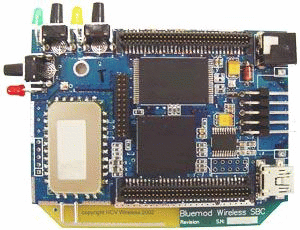Tiny uClinux SBC gains Bluetooth recognition
Jun 17, 2002 — by LinuxDevices Staff — from the LinuxDevices Archive — viewsToowong, Australia — (press release excerpt) — HCV Wireless announced that their BlueMod Bluetooth single-board computer (SBC) has been officially recognized as a Bluetooth product by the Bluetooth Special Interest Group (SIG). This makes BlueMod the world's first (and only) qualified Bluetooth SBC. Typical applications for the highly compact (2.75 x 2.1 x 0.4 in.) BlueMod Bluetooth SBC include remote control, cable replacement, gateway, access point, web server, kiosk, security, access control, automation, robotics, remote sensors and transducers, data logging, and telematics.
BlueMod runs the uClinux operating system on an embedded 32-bit 50 MIPS CPU with 8MB of SDRAM and 2MB of Flash memory. The system provides a complete Bluetooth implementation with a built-in Bluetooth radio, protocol stack and profiles. The proprietary serial interface is RS232 with addditional general purpose I/O pins. Onboard ports include USB 1.1 device port, GPI/O and RS232.

Two expansion connectors provide access to the 16-bit processor bus as well as UART, GPIO, SPI, MII and PWM ports which can be used to adapt the system to a particular application. The Ethernet accessory card, for example, attaches to the expansion connectors and enables BlueMod to work as a LAN access point for Bluetooth enabled devices.
BlueMod can serve as either a pre-qualified Bluetooth product for OEMs or a rapid Bluetooth prototyping platform for system integrators and application developers. The BlueMod Starter Kit is normally retails for US$2,999. HCV Wireless is currently offering a half price special (through August 31, 2002). A free Bluetooth USB dongle (for PCs) or a free Bluetooth Compact Flash card (for PDAs) is also included with each kit.
This article was originally published on LinuxDevices.com and has been donated to the open source community by QuinStreet Inc. Please visit LinuxToday.com for up-to-date news and articles about Linux and open source.